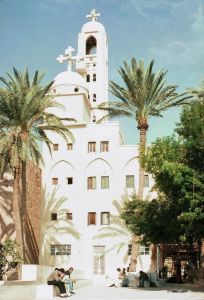| Founded by
Alexander the Great, center of classical learning as well as of early
Christian life and thought in Egypt. |
 |
|
Bishoy
Monastary,
Alexandria, Egypt
|
Strategically located
at the mouth of the Nile River with connections to the whole Mediterranean
world, Alexandria was founded by Alexander the Great in the fourth century.
A cosmopolitan city, it had large numbers of Jewish as well as Greek inhabitants.
It won early fame as a center of classical learning and was the home of
one of the most famed libraries of antiquity. In Alexandria Christianity
probably emerged out of the Jewish community there and appears to have
been shaped by many competing traditions. Jewish scholars of the city
had fostered a tradition of interpreting the Scriptures in the context
of Greek philosophy, and early Christian scholars continued this tradition.
Alexandrine scholars were also influenced by gnosticism.
It was the location of a well known catechetical school. Cyril of Alexandria
and Origen are the best known of its
early teachers. Their theology exemplifies the attempt of many Alexandrian
theologians to interpret the Christian faith in the terms of Greek philosophy.
Modern scholars have thus associated the name of this city with the so-called
Alexandrian theology. Alexandria
was declared a patriarchate second only to Rome by the Council
of Nicea I in 325, but its importance was later diminished by the
rise of Constantinople. In the seventh
century Alexandria passed into the control of first the Persians and later
of the Arabs.
|